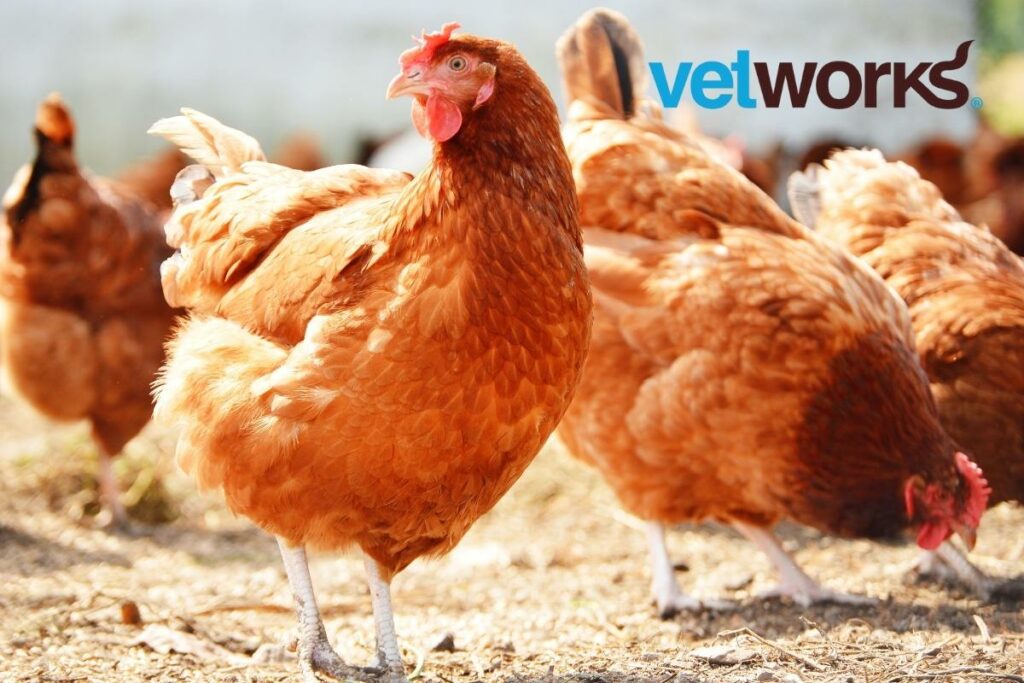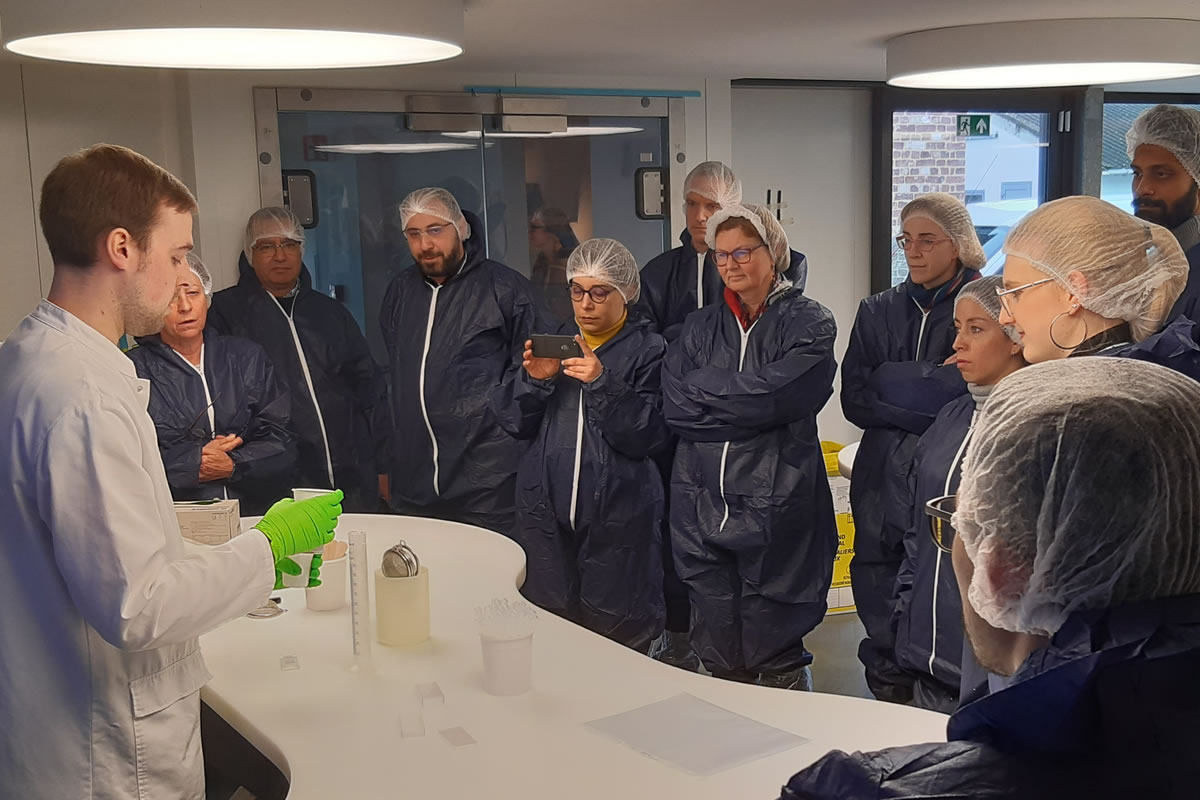Why Vetworks is the leading provider of parasitology training for poultry professionals
At Vetworks, we pride ourselves on being the leading provider of parasitology training for poultry professionals.
What makes our training unique is that it gives you a complete overview of the academic state of the art, while also providing you with the practical experience you need to put what you’ve learned into action on your farm.
We’re also unique in that our team has a wealth of global experience to share, so you can be confident that you’re getting the best possible training available.

Parasitic diseases in poultry
In this post, we’ll give you an overview of what the parasitology training of Vetworks entails and how it can benefit you and your farm.
We’ll also share some of our unique insights into the field of poultry health so that you can get a taste of what you can expect from our course.
By the end, we hope you’ll have a better understanding of why the Vetworks Academy is a leading provider of parasitology training for poultry professionals.
What you can expect from our parasitology training
When you come to the Vetworks Academy for a parasitology training, you can expect to receive a complete overview of all aspects of poultry health and parasitic diseases.
We’ll start by giving you a comprehensive introduction to poultry anatomy and physiology so that you have a solid foundation on which to build your knowledge. From there, we’ll move on to discussing different types of parasites and how they can impact the health of your flock. We’ll also cover topics such as biosecurity, zoonoses, and effective parasite control measures.
In addition to classroom-based learning, we also offer hands-on experience in our state-of-the-art laboratory facilities. This allows you to put what you’ve learned into practice and gain confidence in your ability to detect and treat parasites on your farm.
In addition to providing you with an excellent education, our parasitology training also sets you up for success in your job. That’s because we focus on more than just academic knowledge – we also guide developing effective health programs for your farm that take into account both technical and financial considerations.
At Vetworks, we believe that this holistic approach is essential for protecting your flock against parasites and other diseases.

What is parasitology in poultry and why is it important?
Parasitology is the study of parasites, their hosts, and the relationship between them. Parasites are a diverse group of organisms that can cause a wide range of diseases in poultry.
Some common poultry parasites include mites, lice, ticks, and roundworms. These parasites can cause irritation, anemia, weight loss, and even death in poultry. In addition to causing disease, parasites can also transmit other diseases to poultry, such as avian influenza and Newcastle disease.
As a result, parasitology plays an important role in the prevention and control of poultry diseases.
Parasitologists work to understand how parasites interact with their hosts and develop strategies to control or eliminate them. This may involve developing vaccines or medications to prevent or treat parasitic infections, as well as working to improve hygiene and sanitation practices to reduce the risk of transmission.
Some of the topics included in the parasitology training for poultry
General introduction to poultry parasitology
Parasitology is the study of parasites, their hosts, and the relationship between them. Parasites can be found in all sorts of animals, including poultry.
Poultry parasitology is the study of the parasites that infect chickens and other birds. These parasites can cause a variety of problems, ranging from simple irritation to deadly diseases. Training by Vetworks can help properly identify, diagnose and treat poultry for parasites.

Overview and biology of poultry helminths
Poultry helminths are a type of parasitic worm that can infect chickens and other birds. These parasites can cause a variety of health problems, including:
- anemia,
- weight loss,
- decreased egg production,
- in severe cases, poultry helminths can lead to death.
Vetworks can provide training on how to identify and treat these parasites. The biology of poultry helminths is complex, but the Vetworks team has the expertise to help farmers and veterinarians understand and control these parasites.
With our help, poultry farmers can better protect their flocks from the harmful effects of these worms.
Histomonas and heterakis
Two prevalent poultry parasites are Histomonas and Heterakis. Both of these parasites can cause significant economic losses in commercial poultry operations. Infection with either of these parasites can lead to decreased egg production, reduced body weight gain, and increased mortality.
Histomonas is also a zoonotic agent, meaning that it can be transmitted from birds to humans.
Heterakis is not considered a zoonotic agent, but it can cause severe enteric disease in young chicks.
Poultry producers need to be aware of these parasites and take steps to prevent them from infecting their flocks.
One way to do this is to attend a training course on poultry parasitology offered by Vetworks. This course will provide participants with the latest information on these parasites and how to control them.
How to design deworming programs in practice
Any poultry farmer knows that parasites can wreak havoc on a flock. Not only do they cause discomfort and disease, but they can also lead to reduced egg production and sometimes death.
As a result, it is essential to also maintain a regular deworming program.
However, designing an effective deworming program can be challenging.
The veterinary experts at Vetworks can help.
- Our team of specialists has extensive experience in poultry parasitology and can tailor a program to meet the specific needs of your flock.
- We also offer ongoing training to ensure that your staff is up-to-date on the latest developments in parasite control.
Best farm approach for broilers and breeders
A balanced, comprehensive approach to broiler and breeder flock health is essential for optimal productivity and profitability on today’s poultry farms. A key part of this approach is ensuring that farm personnel is properly trained in all aspects of flock management.
Vetworks offers a comprehensive training program that covers all aspects of broiler and breeder flock health, from biosecurity and nutrition to disease prevention and treatment.
Our program is delivered by experienced veterinarians who have a deep understanding of the challenges faced by today’s poultry farmers. Through hands-on demonstrations and real-world case studies, farm personnel can learn the skills they need to effectively manage their flocks.
With Vetworks, farmers can be confident that their personnel is receiving the best possible training in all aspects of flock health management.

The importance of coccidiosis in poultry
Coccidiosis is caused by the protozoan parasites of the genus Eimeria, which infect the intestines of chickens and other fowl.
Coccidiosis typically results in severe diarrhea, weight loss, and sometimes death in young birds. However, older birds may also be affected, especially if they are stressed or immunocompromised.
Early diagnosis and treatment can help to reduce the severity of the coccidiosis disease and improve the chances of recovery.
This Vetworks parasitology training course will cover all aspects of coccidiosis, from recognition and diagnosis to treatment and prevention.
With this knowledge, you can help to better protect your flock from this devastating disease.
Safe use of anticoccidials
Anticoccidials are a class of drugs that are used to prevent or treat coccidiosis, a disease caused by the protozoan parasite Eimeria.
When used properly, anticoccidials can be an effective tool for preventing and treating coccidiosis. However, improper use of anticoccidials can lead to the development of resistance in the parasite population, making the drugs less effective.
The hands-on training provided by Vetworks can help farmers and other users of anticoccidials to understand how to use the drugs properly and minimize the risk of resistance development.
In addition, Vetworks can provide ongoing support and advice on the best practices for using anticoccidials.

Dermanyssus: life cycle, monitoring, treatment, resistance
Dermanyssus gallinae is a parasitic mite that feeds on the blood of poultry. These mites can have a significant impact on bird health, leading to anemia, weight loss, and even death.
Monitoring for these mites is essential to prevent an infestation.
Treatment options are available, but resistance is a growing concern.
Training by Vetworks can help poultry farmers effectively monitor their flocks and identify potential infestations early. This training can also provide valuable information on treatment options and resistance management.
By taking these steps, farmers can help to protect their birds from the effects of Dermanyssus infestations.

Visits to a specialized poultry lab and a necropsy room
A healthy animal population is essential for the well-being of both humans and animals. To help ensure the health of our animal population, it is important to have experts who are trained in the detection and treatment of parasites.
The comprehensive parasitology training program offered by Vetworks also includes a visit to a specialized poultry lab and a necropsy room.
This hands-on experience will allow you to learn how to identify parasites and understand the importance of early detection and treatment. And because our training is carried out by experienced veterinarians and academics, you can be confident that you’re getting the best possible education.
In addition, the Vetworks parasitology training program will provide you with the skills you need to effectively communicate with your team and clients about parasite prevention and control.
As a result, as a Vetworks graduate, you will be better prepared to work in any setting where animal health is a priority.

Parasitology Poultry Training – Contact Vetworks
If you’re looking for comprehensive, practical, and affordable parasitology training, look no further than the Vetworks Academy.
Our highly experienced team is dedicated to providing you with the knowledge and skills you need to succeed in this field.
Contact us today to learn more about our unique approach to teaching parasitology or register for one of our upcoming courses.
More poultry trainings:
Reducing antimicrobial use in poultry farming – training course
- Why Vetworks is the leading provider of parasitology training for poultry professionals
- Parasitic diseases in poultry
- What you can expect from our parasitology training
- What is parasitology in poultry and why is it important?
- Some of the topics included in the parasitology training for poultry
- Visits to a specialized poultry lab and a necropsy room
- Parasitology Poultry Training – Contact Vetworks

